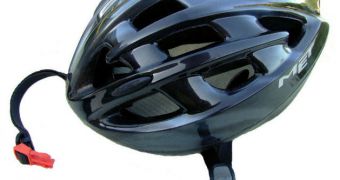According to a new scientific investigation currently being carried out by experts at two Bath universities, wearing a crash helmet while riding a bike is indeed advantageous for your safety, but may pose other risks to your health. Additionally, the researchers have discovered up until now, the helmets could also be affecting the way these people ride their bikes. This research project is being funded by The Leverhulme Trust, AlphaGalileo reports. One of the primary targets for the new investigation is to determine how wearing helmets affects the riders' hearing and ability to concentrate and focus on the road.
The investigation was co-led by University of Bath (UB) Department of Mechanical Engineering expert Dr. Michael Carley, and Bath Spa University (BSU) Department of Psychology scientist Dr. Nigel Holt. The two collaborated closely with colleague Dr. Ian Walker, from the UB Department of Psychology. Together, the experts perform tests in the field, conducting measurements of how noise is received, transmitted and modified inside these helmets, and how that affects a rider's ability to focus.
“The noise inside the helmet at the legal speed of 70 mph [miles per hour] is higher than the legal limit for noise at work – more than enough to cause serious hearing damage. The issue isn't noisy engines or loud exhausts as you may think. The noise is simply from the airflow over the helmet. Ear plugs won't help much either as the noise is transferred into the inner ear from the rider's bones. This has been known for 20 years yet little research has been done on the noise and its effects,” Carley reveals.
This issue merits close investigation, the team says, so the study will be split into two parts. The first will deal exclusively with how noise gets transmitted, or amplified, through the head-helmet system. “We already know that the noise passes to the ear partly through air and partly through the rider's bones. To reduce hearing damage we must establish which route is more important and a higher priority to hearing protection measures,” Carley, who will also be directing this portion of the investigation, says.
The second part of the work will focus on subjecting test participants to cognitive tests, while at the same time exposing them to the level of noise that someone riding a bike is subjected to. The rationale behind this approach is that driving any vehicle requires a great deal of concentration and attention, and that, therefore, the effects of sounds on these two mental traits need to be analyzed. “It is known that noise can affect perception and cognition but, so far, nobody has tried to examine how noise in motorcycling affects the performance of riders,” Holt shares. “This isn't about putting people off riding or wearing helmets; it's about finding ways to reduce this damage so that riders can have a better riding experience,” he adds.

 14 DAY TRIAL //
14 DAY TRIAL //